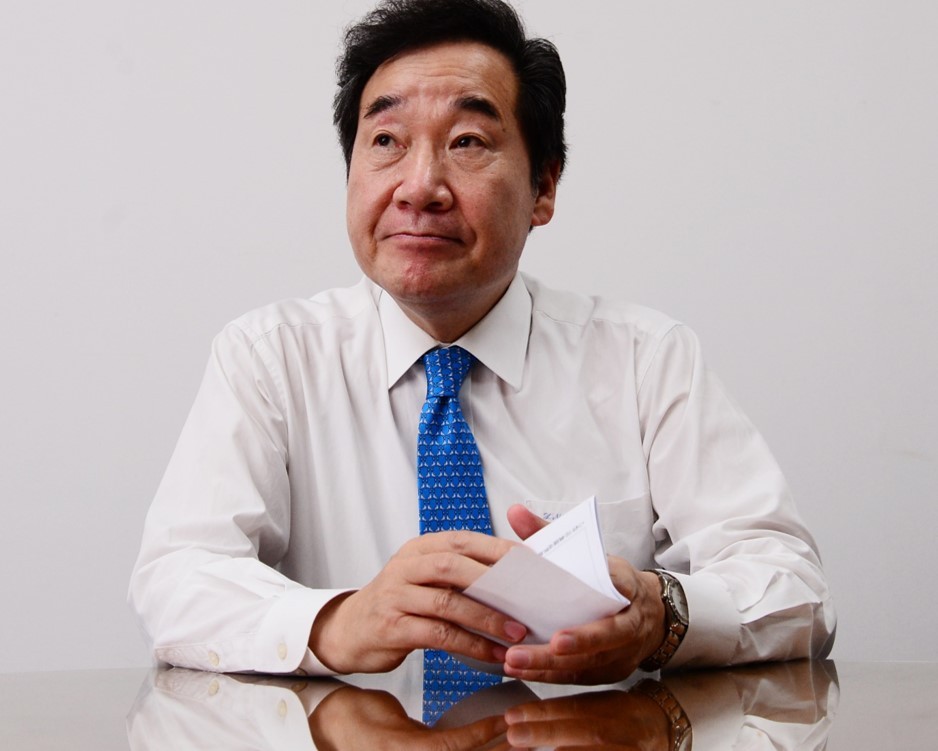Rep. Lee Nak-yon, a Democratic Party of Korea heavyweight who announced his presidential bid Monday, believes South Korea now needs a new leader befitting its raised status.
“South Korea’s status has risen to a high level,” Lee said in an interview with The Korea Herald. “The public has gained a lot of confidence both internally and externally, but at the same time we face a lot of challenges.
“We need a leader who is worthy of strengthening the nation’s status and a leader who knows how to solve internal and external problems,” Lee said. “I think I am the one who is relatively close to those conditions.”
The journalist-turned-politician, 69, has had a brilliant political career. He has been prime minister, leader of the ruling Democratic Party, a five-term lawmaker and governor of South Jeolla Province. Lee is the only prime minister to have visited 25 countries during his tenure, where he said achievements were made.
As Korea’s economy and security have become more intertwined with other countries, Lee said the nation should strengthen ties with its allies and expand cooperation with neighboring countries.
With a strong ally in the US, Lee believes Korea can expect a lot from the new Joe Biden administration in economy, defense and peace on the Korean Peninsula.
“Biden’s policy changes are highly noteworthy,” Lee said. “In the days of Trump, joining the ‘Quad’ and missile defense policy was always like our (unsolved) assignments,” he said, referring to the strategic dialogue between the US, Japan, Australia and India.
“Biden instead wants cooperation in areas of semiconductors, vaccines, batteries and even space,” he said.
“He has shown his willingness to develop into a broader alliance over global issues related to the economy and human safety.
“The relations between the two countries are becoming more diverse and equal, and Korea can play a greater role, beyond the security alliance, to check Beijing.”
Between the two global superpowers, the US and China, Korea’s diplomacy should be smarter and more agile instead of relying on only one side, Lee said.
“Now is not like the old Cold War where we had to belong to either side of the camp,” he said. “The strategy of cooperating with the US for security and China for the economy is no longer viable.”
“Both countries are very important to us in terms of defense and economy. The alliance with the US should be strengthened while relations with China should also be developed into a (true) strategic cooperative partnership.”
On inter-Korean relations, Lee sees a positive mood having been created since the inauguration of the Biden administration: Korea and the US agreed in principle to abolish the Korea-US working group, which has been considered an obstacle to inter-Korean exchanges; Biden has also appointed Sung Kim as his special representative for North Korea.
“The Biden administration has declared a pragmatic approach to North Korea. Taking this opportunity, the South Korean government should make all-out efforts for the peace process on the Korean Peninsula,” Lee said, hoping the North will also seize this opportunity.
He believes a couple more chances for dialogue with the North may come during the Moon Jae-in administration.
Alongside Pope Francis’ visit to the North, he mentioned the Beijing Winter Olympics in February next year.
“If I were President Xi Jinping, I would arrange an inter-Korean summit around the event. For Xi, this can be an opportunity to show off his global leadership and to contribute to peace on the Korean Peninsula.”
With deteriorating relations with Japan, Lee believes restoration of trust between leaders is a priority.
The relationship of the two nations has further soured following the Japanese government’s marking of the Dokdo islets as its territory on its Olympics website and its decision to release contaminated water into the Pacific Ocean.
“At the public level, exchange and cooperation continue in various fields. But in politics and diplomacy, there is a deadlock,” he said, adding Japan’s attitude is very rigid diplomatically.
“Korea is ready to help Prime Minister (Yoshihide) Suga to make the Olympics and his leadership successful,” he said. “But if Japan continues to make such obstacles, Korea has no choice but to even consider boycotting the sport event.”
As Korea’s status has risen to a high level and its trade issues become complicated, Lee plans to promote a trade minister -- which is now at a vice minister level -- to a minister level if he becomes a president.
“Recent international trade issues are a mixture of diplomatic and security issues, which require a comprehensive approach from the national strategic level beyond simple trade issues,” he said.
A trade minister is thus affected by foreign affairs and security, he said, citing China’s economic retaliation for the US-deployed Terminal High Altitude Area Defense anti-missile system and Japan’s export restrictions for political issues.
“If we send a vice minister-level representative to trade negotiations, this will result in us losing negotiating power. It is urgent to upgrade the position.”
By Shin Ji-hye (
shinjh@heraldcorp.com)






![[Herald Interview] 'Trump will use tariffs as first line of defense for American manufacturing'](http://res.heraldm.com/phpwas/restmb_idxmake.php?idx=644&simg=/content/image/2024/11/26/20241126050017_0.jpg)
![[Exclusive] Hyundai Mobis eyes closer ties with BYD](http://res.heraldm.com/phpwas/restmb_idxmake.php?idx=644&simg=/content/image/2024/11/25/20241125050044_0.jpg)
